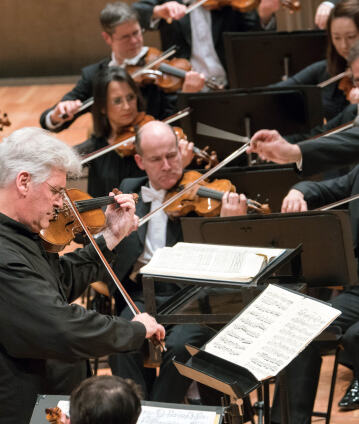Benefit Concert of the Federal President of Germany with Zubin Mehta and Pinchas Zukerman

One of his last appearances as Federal President of Germany brought Joachim Gauck to the Berliner Philharmoniker – as the host of a benefit concert for UNICEF. Two world stars accepted his invitation: Zubin Mehta and Pinchas Zukerman. The programme featured Tchaikovsky’s late-Romantically agitated Fifth Symphony and Edward Elgar’s Violin Concerto, which is characterised by its at once emotional and modern tonal language.
None other than Richard Strauss once called him “the first English progressive musician”: Edward Elgar, born in 1857 in Broadheath near Worcester. Though he grew up in a musical family, Elgar was already past 40 when at the turn of the century he gained general recognition as a composer with compositions like the Enigma Variations and the oratorio The Dream of Gerontius. Pomp and Circumstance, the suite of orchestral marches completed in 1930, won him in later years the rather dubious reputation of a flag-waving musical patriot. And after the highly respected Elgar died in 1934 – having become the grand old man of British music – younger musicians did not hesitate to subject his compositions to hostile criticism: the former “progressive” was denounced at once as a die-hard. Wrongfully so, as shown not least by Elgar’s violin concerto premiered by Fritz Kreisler in 1910! Without a doubt, the ca. 50-minute composition is built on the musical foundations of the late romantic era, but with what élan and vigour Elgar once again revives all those compositional traditions that were definitively laid to rest with the outbreak of the First World War a few years later. Elgar himself is said to have been very satisfied with this work: “It’s good!” he is quoted as saying, “Awfully emotional – too emotional! But I love it!”
Peter Tchaikovsky, who was known for his self-doubt, was similarly happy with the work on his Fifth Symphony: the piece “gives me great satisfaction”, he wrote to his brother Modest in 1888. At the premiere, however, which took place a few weeks later, the hoped-for success failed to materialise. The Petersburg press felt compelled to criticise the “most trivial effects” in the score of the work – triggering a creative crisis in Tchaikovsky! The Fifth only began to take off as an international triumph after it was successfully performed in Hamburg early in 1889. And now the composer too was reconciled with his music: “What I like most is that the symphony has ceased displeasing me, and I love it anew.” Zubin Mehta, a long-standing friend and artistic companion of the Berliner Philharmoniker, conducts this highly expressive concert programme. The solo part in Elgar’s violin concerto is played by Pinchas Zukerman, one of the greatest violin virtuosos of our time.
© 2017 Berlin Phil Media GmbH
Related interviews
Artists
Our recommendations
- Zubin Mehta conducts Stravinsky’s “Le Sacre du printemps”
- Zubin Mehta conducts Bruckner’s Symphony No. 9
- Zubin Mehta conducts Mozart, Schumann and Tchaikovsky in Évian
- Beethoven’s Violin Concerto with Leonidas Kavakos and Zubin Mehta
- Zubin Mehta conducts Bruckner’s Eighth Symphony
- Zubin Mehta conducts “Otello”